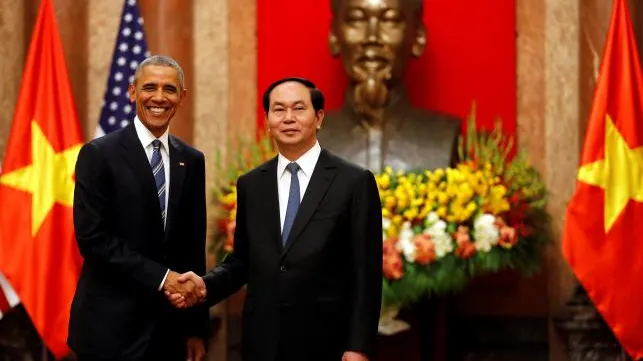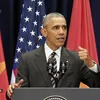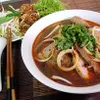Vietnam – US Joint Statement

The following is the full text of the Vietnam-US Joint Statement.
“At the invitation of the President of the Socialist Republic of Vietnam Tran Dai Quang, President of the United States of America Barack Obama paid an historic visit to Vietnam to celebrate the Comprehensive Partnership between the two countries and to advance their shared vision for the future. On the occasion of the visit and the May 23, 2016, meeting between the two leaders, the United States and Vietnam adopted this Joint Statement. Both sides noted with satisfaction the rapid, substantive, and comprehensive growth of U.S.-Vietnam relations over the past year, guided by the U.S.-Vietnam Comprehensive Partnership of 2013 and the Joint Vision Statement issued during the historic visit to the United States by General Secretary of the Central Committee of the Communist Party of Vietnam Nguyen PhuTrong in July 2015. The common interests of the United States and Vietnam continued to expand through intensifying the exchange of delegations at all levels and maintaining dialogue mechanisms; promoting economic growth thanks to enhanced trade and investment relations; deepening cooperation in education, science and technology, health, security and national defense, people-to-people ties, human rights, humanitarian, and war legacy issues.
The increasingly enhanced U.S.-Vietnam relations have positively contributed to the joint efforts of the international community in maintaining peace, stability, cooperation and respect for international law in the region, and building a rules-based region. Together, we are addressing regional and global challenges, including climate change, sustainable development, global health, non-proliferation of weapons of mass destruction, peacekeeping, and wildlife trafficking. Toward that end, the two countries reaffirmed their obligations to observe the UN Charter and commitments to respect international law, their respective political systems, independence, sovereignty, and territorial integrity. The United States and Vietnam also committed to strengthening and developing the ASEAN Community, and working with the international community to respond to global challenges . Both sides committed to work together to advance the Comprehensive Partnership in the following areas:
Strengthening Political and Diplomatic Ties
Both sides pledged to continue to exchange delegations at all levels, especially high-level delegations, and to strengthen dialogue between agencies of the two governments. The two sides also intend to expand annual high-level dialogues between their two foreign ministries to discuss measures to strengthen the Comprehensive Partnership and discuss other issues of mutual interest. The two sides concurred that strengthening mutual trust plays a crucial role in enabling a sustainable, healthy, and long-term friendship and cooperation.
Advancing Economic Ties
The two countries resolve to focus on fostering economic cooperation, including trade, investment, science and technology, human resource training, and climate change. The two sides stated that the Trans-Pacific Partnership (TPP) is economically and strategically important, and would promote trade and investment between them, accelerate inclusive economic growth, and create jobs.
The two sides reaffirmed their commitments to seek early ratification and full implementation of this high-standard agreement, including commitments on investment, business facilitation and development, intellectual property, textile, services, labor, and environment. The United States pledged to support Vietnam through robust technical assistance and capacity-building programs to effectively implement and meet the high standards of the TPP. The two sides also reaffirmed their commitment to ensure that economic growth is inclusiveand creates opportunity for all, which is furthered by fostering innovation, entrepreneurship, and sustainable economic development. The two sides highlighted that development cooperation continues to be a driving force in the bilateral relationship. Both countries pledged topromote bilateral trade and investment, and would continue to work toward access for industrial, agricultural, and aquaculturalgoods. The United States and Vietnam committed to consult through the enhanced bilateral Working Group in a cooperative and comprehensive manner regarding Vietnam’s desire to be recognized as a market economy. Both countries welcomed the conclusion of major commercial deals on the occasion of the visit, suchas VietJet’s purchase of 100 Boeing aircraft and Pratt & Whitney engines, as well asa wind energy MOU between GE and the Vietnamese government.
Deepening People-to-People Ties
Both sides affirmed their support for the enhancement of people-to-people ties to strengthen mutual understanding, cooperation, and friendship between the two peoples. The United States welcomed the Vietnamese government’s approval of the Peace Corps to teach the English language in Vietnam. The United States and Vietnam hailed the establishment of Fulbright University Vietnam, which will be a world-class Vietnamese university. Both sides welcomed the bilateral arrangement granting one-year, multiple-entry visas for short-term business and tourism travelers from both countries. Both sides highly valued and recognized the success of the Vietnamese-American community and their activecontributions to the promotion of bilateral ties.
Enhancing Security and Defense Cooperation
The United States and Vietnam reaffirmed their commitment to strengthen defense cooperation between the two countries as outlined in the Memorandum of Understanding on Advancing Bilateral Defense Cooperation in 2011 and the United States–Vietnam Joint Vision Statement on Defense Relations signed in 2015, giving priority to humanitarian cooperation, war legacy, maritime security, peacekeeping, and humanitarian assistance and disaster relief. Both sides reiterated they would continue to strengthen cooperation in the fields of security, combatting transnational crime, and cyber security.
Vietnam welcomed the U.S. government decision to fully lift the ban on the sale of lethal weapons to Vietnam. Vietnam welcomed U.S. maritime security assistance – including through the Maritime Security Initiative (MSI), the Cooperative Threat Reduction program, and Foreign Military Financing – and looked forward to working with the United States to enhance Vietnam’s maritime capabilities.
The United States and Vietnam signed a letter of intent to establish a working group for the Cooperative Humanitarian and Medical Storage Initiative (CHAMSI), which will advance cooperation on humanitarian assistance and disaster relief. The United States reaffirmed its support for Vietnam’s peacekeeping efforts with an aim of assisting Vietnam’s first deployment of the UN peacekeeping forces by 2017. Both countries expressed their satisfaction with their joint efforts to advance humanitarian and war legacy issues. In particular, the United States valued Vietnam’s active cooperation to support the humanitarian mission of providing the fullest possible accounting for U.S. personnel still missing from the war. Both sides agreed to continue their cooperation on unexploded ordnance removal.
Vietnam welcomed cooperation leading to the successful conclusion of the first phase of dioxin remediation at Danang International Airport, with the final phase already underway. The United States committed to partnering with Vietnam to make a significant contribution to the clean-up of dioxin contamination at Bien Hoa Air Base.
Promoting Human Rights and Legal Reform
Both countries pledged to continue supporting the promotion and protection of human rights in conformity with their own constitutions and respective international commitments. The two countries welcomed the results of positive, frank, and constructive dialogues on human rights, especially the 20th round of the U.S.-Vietnam Human Rights Dialogue in April 2016, to narrow differences and continue to build trust. The United States welcomed Vietnam's ongoing efforts in improving its legal system and undertaking legal reform in order to better guarantee the human rights and fundamental freedoms for everyone in accordance with the 2013 Constitution.
Vietnam informed the United States of its plan to revise, amend, and draft laws, including the Law on Religion and Belief, Law on Association, the Amended Law on Legal Aid, the Amended Law on Legal Record, and Law on the Promulgation of Administrative Decisions.
Both sides recognized the contributions that social and religious organizations continue to make in the fields of education, healthcare, and social services in both countries. Both sides encouraged further cooperation to ensure that all people – regardless of gender, race, religion, and sexual orientation, and including persons with disabilities – fully enjoy their human rights. The United States and Vietnam welcomed a letter of agreement on law enforcement and justice sector assistance.
Addressing Regional and Global Challenges The United States and Vietnam reaffirmed their shared commitment to the peaceful resolution of territorial and maritime disputes, including full respect for diplomatic and legal processes, without resorting to the threat or use of force in accordance with the UN Charter and international laws, including the United Nations Convention on the Law of the Sea (UNCLOS). Both countries underscored the commitmentsof parties to the disputes to refrain from actions that aggravate or broaden the disputes and recognize the importance of strictly implementing the Declaration on the Conduct of Parties (DOC) and working to accelerate negotiation with substantive results toward the early conclusion of the Code of Conduct (COC).
In this regard, both countries expressed serious concerns over recent developments in the South China Sea that have caused tensions, eroded trust and threatened peace, security, and stability. Both countries recognized the imperative of upholding the freedom of navigation and overflight and unimpeded lawful commerce in the South China Sea, called for non-militarization and self-restraint in addressing disputes, reaffirmed shared commitments under the Sunnylands Declaration, and committed to working closely with other ASEAN partners in implementing this Declaration.
The United States reaffirmed its commitment to actively coordinate with and support Vietnam in successfully organizing APEC 2017. The United States and Vietnam reaffirmed their commitment to addressing climate change and implementing the Paris Agreement. They shared a desire to see the early entry into force of the Agreement, and are both committed to formally joining the Agreement in 2016. The United States and Vietnam pledged to take a number of practical actions to advance climate mitigation and adaptation, as well as enhance transparency and capacity building in the U.S.-Vietnam Climate Partnership, including in the Mekong River Delta. Future work will build on the results of collaboration between the United States and Vietnam in implementing programs under the Lower Mekong Initiative.
The United States pledged its continued support for Vietnam in responding to the latter’s worst drought in over 90 years and salinization, and in advancing sustainable economic development in the lower Mekong basin. As a development partner of the Mekong River Commission (MRC), the United States expressed its commitment to supporting cooperation among MRC members and between MRC members and other regional mechanisms in using, managing, and developing trans-boundary water resources in an effective and sustainable manner. The two countries expressed support for an expanding civil nuclear partnership as we seek to reduce emissions from the global power sector, the signing of the Administrative Arrangement under the U.S.-Vietnam Agreement for Cooperation in the Peaceful Uses of Nuclear Energy ("123" Agreement), and the highest standards of nuclear safety, security, and nonproliferation. Both countries welcomed the successful outcomes of the 2016 Nuclear Security Summit and pledged to continue to work together to strengthen the global nuclear security architecture.
The two sides intend to establish the U.S.-Vietnam Joint Commission on Civil Nuclear Cooperation to facilitate the implementation of the 123 Agreement. The two countries committed to sustain their successful cooperation and joint leadership under the Global Health Security Agenda (GHSA), particularly with respect to collaboration on the emergency operations centers and outbreak detection and response in humans and animals, as well as implementation of a national roadmap to achieve each of the GHSA targets. The United States pledged its support to improve Vietnam’s capacity in coastal medicine. The United States and Vietnam committed to work together regionally and globally to prevent, detect, and respond to epidemic threats, and both countries affirmed to undertake a joint evaluation of these efforts in 2016. Both countries also reaffirmed their commitment to combating wildlife trafficking and protecting biodiversity under the new U.S.-Vietnam Partnership to Combat Wildlife Trafficking.
Deepening a Long-Term Partnership
Both sides agreed to further enhance the U.S.-Vietnam Comprehensive Partnership, making it deeper, more substantive, and more effective in order to better serve the interests of the two peoples for peace, stability, and cooperation in the region and the world.”
Tags:





